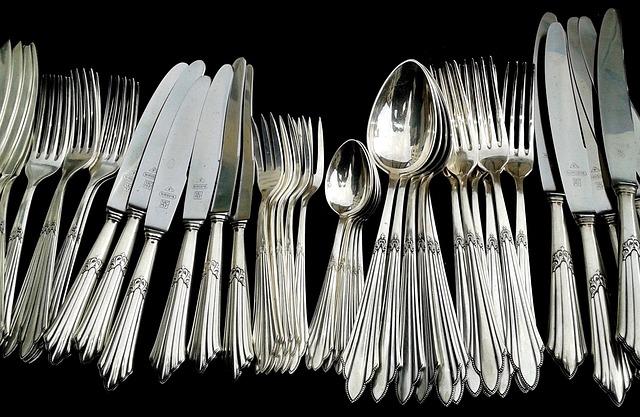In a world increasingly aware of its environmental footprint, the humble utensil has emerged as a silent yet pivotal player in the fight against single-use plastics. As we navigate our daily routines, the conveniences of disposable cutlery often tempt us toward a path of convenience that piles up waste in landfills and oceans. Though, a growing movement is championing the power of reusable utensils, presenting a compelling array of thoughtful alternatives that blend functionality with sustainability. This article delves into the world of reusable utensils—exploring their types, benefits, and the seamless integration of these eco-friendly choices into our everyday lives. Join us as we uncover how a simple shift in our dining habits can contribute to a larger narrative of environmental stewardship, one fork, spoon, and knife at a time.
Transforming Your Kitchen: The Benefits of Switching to Reusable Utensils
Embracing reusable utensils in your kitchen can lead to a profound shift in how you approach meal planning and dining. By opting for materials like stainless steel,bamboo,or silicone,you not only contribute to a healthier planet but also enhance your dining experience. Reusable utensils are more durable and frequently enough designed with ergonomic features that can improve grip and comfort during use. Moreover, they come in a variety of styles and colors, allowing you to personalize your kitchenware while expressing your individuality. The transition from single-use plastics to eco-friendly alternatives can transform the simplest task of eating into a more enjoyable and mindful experience.
Switching to reusable utensils also brings forth a plethora of tangible benefits that extend beyond environmental impact. Consider the following advantages:
- Cost-Effective: Investing in reusable utensils can save money in the long run, reducing the need to continuously purchase disposable options.
- Health Conscious: Many reusable utensils are made from non-toxic materials, ensuring that you avoid harmful chemicals often found in single-use plastics.
- Versatility: Reusable utensils are suitable for various occasions,from casual picnics to formal dinners,catering to all your culinary needs.

Exploring Eco-Friendly Material Options for everyday Utensils
As the world shifts towards sustainability, the use of eco-friendly materials in everyday utensils is becoming increasingly popular. Options like bamboo,stainless steel,and biodegradable plastics are not just trendy but are also effective alternatives to traditional single-use plastics. Bamboo, as an example, is a rapidly renewable resource known for its durability and lightweight properties. Its natural antimicrobial properties make it an excellent choice for utensils, as it requires less energy to produce and can decompose in compost when it reaches the end of its life cycle.
Another promising material is stainless steel, a favorite for its longevity and resistance to wear and tear. Its reusable nature means it can easily outlast hundreds of single-use plastic utensils. on the other hand,biodegradable plastic utensils made from plant-based materials like cornstarch provide an immediate solution for those who crave the convenience of disposables without the environmental impact. The table below summarizes these materials:
| Material | Pros | Cons |
|---|---|---|
| Bamboo | biodegradable, lightweight, antimicrobial | May splinter over time |
| Stainless Steel | Durable, reusable, recyclable | Heavier than plastics |
| Biodegradable Plastic | Compostable, similar feel to plastic | may require specific conditions to break down |

Practical Tips for Incorporating Reusable Utensils into Your Routine
Adopting reusable utensils is not just an eco-friendly choice; it can also seamlessly fit into your daily activities. Start by designating a specific spot in your kitchen or bag for your reusable utensils, ensuring they are always within reach. Consider investing in a sleek travel case that can hold a fork,knife,and spoon.This keeps them clean and easy to grab when heading out. Remember to clean your reusable utensils after every use; a quick wash in warm, soapy water does the trick. Incorporate a routine where you take them with you—whether to work, school, or picnics—so they become a natural part of your mealtime experience.
To make the switch easier, try replacing your disposable utensils with a few stylish options. Bamboo, stainless steel, or silicone utensils not only look great but are durable and can be washed and reused countless times. When planning meals or outings, think ahead about your utensil needs. As an example, you might find it helpful to keep a small stash of reusable utensils in your lunchbox or car. This way, you’ll always have the right tools for any meal, reducing reliance on single-use plastics. Here are some ideas to consider:
- At Home: Opt for serving utensils made from sustainable materials.
- On the Go: Carry a compact cutlery set in your bag or car.
- Meal Prep: Include reusable utensils in your food storage for easy access.

Making a Positive Impact: The Environmental Case for Ditching single-Use Plastics
Choosing to abandon single-use plastics is not just a personal choice; it is a collective responsibility that we owe to our planet. Reusable utensils are an elegant solution to the plastic crisis, as they significantly reduce the amount of waste produced daily. By switching to durable materials such as stainless steel,bamboo,or silicone,we actively contribute to minimizing ocean pollution and landfill overflow. These alternatives not only help in protecting wildlife but also foster a more sustainable lifestyle. Here are some compelling reasons to consider reusable utensils:
- Durability: Unlike disposable plastics,reusable utensils are designed to withstand regular use and last for years,making them a cost-effective choice.
- Health Benefits: Many reusable options are non-toxic and free from harmful chemicals frequently enough found in single-use plastics, such as BPA.
- Variety of Designs: from sleek metal forks to vibrant bamboo spoons, there’s a diverse range of stylish utensils that suit every aesthetic.
- Convenience: Reusable utensils are portable and can be easily packed for on-the-go meals, ensuring you always have a reliable option.
Transitioning away from single-use plastics doesn’t need to be an overwhelming endeavor; it can start small. Many local businesses and community initiatives are now focused on helping people make this switch. Whether through workshops on how to incorporate reusable items into daily life or providing incentives for choosing sustainable alternatives, the movement is gaining traction worldwide. Below is a simple comparison table that illustrates the environmental impact of switching from single-use to reusable utensils:
| Type | lifetime impact | Plastic Waste Avoided |
|---|---|---|
| Single-Use Plastic Fork | Used once | 1 Fork = 1 Item |
| Reusable Stainless Steel Fork | 10+ years | 10+ Years = 3650 Items |
The Way forward
In a world increasingly aware of the impact of our choices, the shift towards reusable utensils represents more than just a trend; it signifies a collective commitment to sustainability. By embracing everyday alternatives to single-use plastics, we not only reduce waste but also inspire those around us to reconsider their habits. Whether it’s a sleek stainless steel fork, a bamboo spoon, or a set of sturdy silicone straws, these utensils remind us that small changes can lead to notable outcomes. As we transition towards a greener future, let us celebrate the power of reusability and the role it plays in protecting our planet. Together, we can forge a path where convenience doesn’t come at the expense of the habitat, but rather enhances our everyday lives while nurturing the world we share. The next time you reach for a fork,think not just of the meal ahead,but of the lasting impact of that choice—because every small act of mindfulness is a step toward a cleaner,healthier Earth.




